Attia Hosain
|
She was born in 1913 into an aristocratic family in Lucknow – a city that is a byword for Muslim scholarship and culture. Her father was educated at Cambridge University, and her mother was the founder of an institute for women’s education and welfare. Hosain attended the Isabella Thoburn College at the University of Lucknow, becoming the first woman from a landowning family to graduate in 1933. She also undertook private tuition in Urdu and Persian at home, where she was brought up according to the Muslim tradition. From her mother’s family of poets and scholars she drew a rich knowledge of Urdu, Persian and Arabic. Her knowledge of English came from an English governess, and subsequently as one of the few Indian girls at an English medium school. She was the first woman from her background to take a degree at Lucknow University. Influenced by the left-wing, nationalist politics of her Cambridge-educated brother and his friends, Hosain became involved with the All-India Progressive Writers’ Association, a group of socialist writers which included Ahmed Ali, Mulk Raj Anand and Sajjad Zaheer. Encouraged by the poet and political activist Sarojini Naidu, she attended the 1933 All-India Women’s Conference in Calcutta, reporting on it for Lucknow and Calcutta newspapers. In this period, she also began to write short stories. In 1947, when India was partitioned into India and Pakistan, Hosain was in London with her husband, who had been posted the year before to the High Commission. The division of the two countries and the separation of two religious communities caused her great pain. Immensely proud of her heritage as both a Muslim and an Indian, she chose to remain in England and bring up her daughter and son – now the film director Waris Hussein – on her own. ![Attia Hosain, son Waris Hosain , Shama Habibullah, London, 1960s. {Both children are filmmakers, Waris in the US and Shama in India.]](http://www.sangatreview.org/wp-content/uploads/attiaandchildren-e1458602469217.jpg) Attia Hosain, son Waris Hosain , Shama Habibullah, London, 1960s. (Both children are filmmakers, Waris in the US and Shama in India.) The change brought her a career as a regular broadcaster with her own women’s programme on the BBC World Service and a new perspective. She continued to write and began work as a broadcaster, presenting a woman’s programme for the Indian Section of the Eastern Service of the BBC from 1949. During her time at the BBC, she broadcast on a wide range of topics, from art to music to religion to cinema. As well as reading scripts, she participated in discussion programmes and acted as a roving reporter for the Weekend Review. In 1953 she published her first work of fiction, a collection of short stories titled Phoenix Fled. This was followed in 1961 by her only novel, Sunlight on a Broken Column. Attia’s niece is the Pakistani author Muneeza Shamsie and her great-niece is author Kamila Shamsie. British television director Waris Hussein is her son and film producer Shama Habibullah is her daughter .
Included in Anthologies:“Time is Unredeemable” in Infinite Riches Ed. Lynn Knight, Virago Modern Classics, 1993 “The First Party” in The Inner Courtyard Stories by Indian Woman, Ed, Lakshmi Holstom, Calcutta, Rupa & Co. 1991 “A Woman and a Child” in More stories from the Raj and After Introduction by Saros Cowasjee, Landon, Grafton Books, 1986 “Of memories and meals” in Odyssey Short stories by Indian women writers settled abroad Ed. Divya Mathur, Star Publications, Delhi, 1998. Voices of the Crossing, Serpents Tail 1998 Books on or including Attia HosainAttia Hosain A Diptych Volume Writers of the Indian Diaspora: Series by R.K. Kaul, Jasbir Jain pub. Rawa Publications, Jaipur and New Delhi, 2001. Dwelling in the Archive: Women Writing House, Home, History in Late Colonial India by Antonia Burton pub OUP (USA) 2003. Attia Hosain’s short stories also appeared in magazines such as The Atlantic Monthly (USA); Liliput (UK) Illustrated weekly of India References: Dictionary of National Biography, UK, Oxford Companion to 20th Century Literature
|

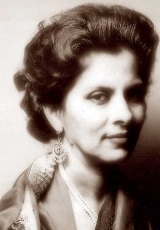
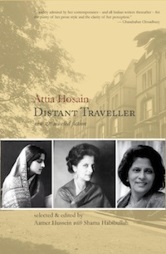 Distant Traveller: New & Selected Fiction
Distant Traveller: New & Selected Fiction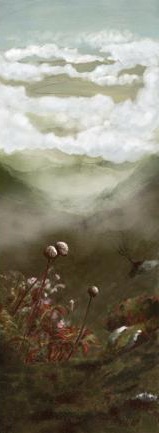 “Storm” by Attia Hosain
“Storm” by Attia Hosain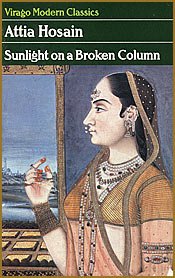 Sunlight on a Broken Column
Sunlight on a Broken Column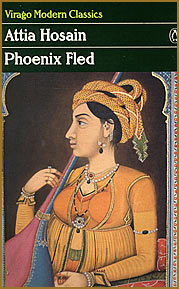 Phoenix Fled
Phoenix Fled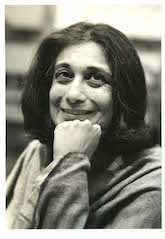
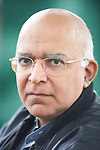 Hosain 1913-1998
Hosain 1913-1998